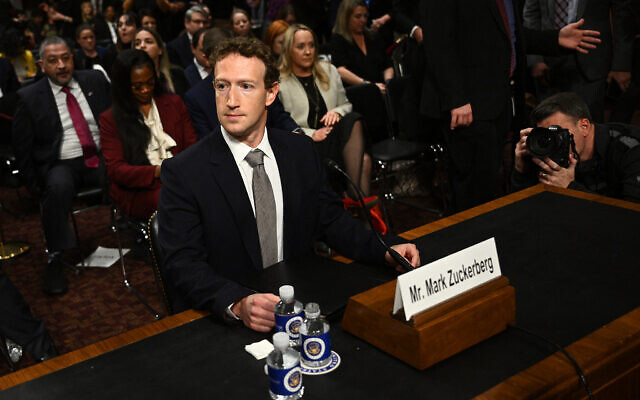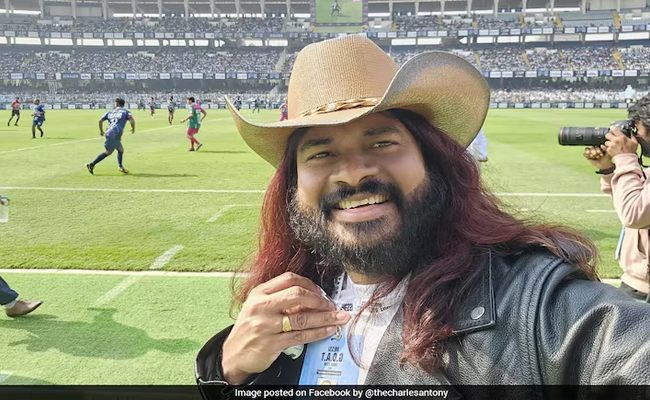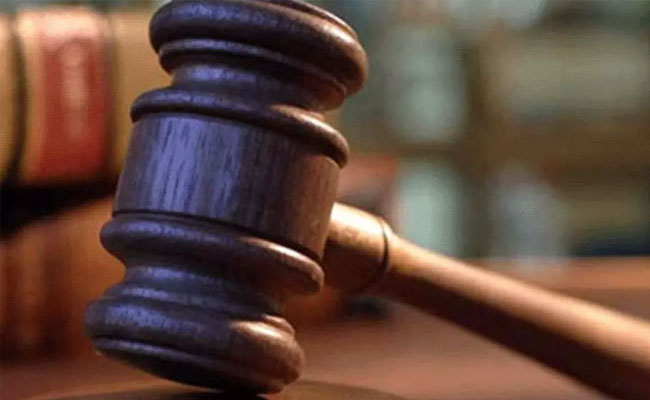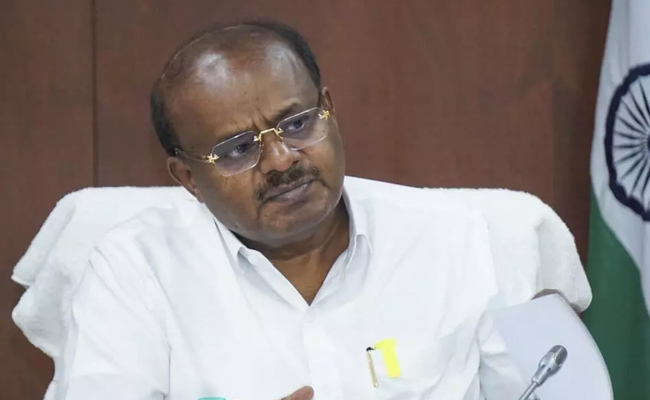In a heated congressional hearing on Wednesday, Meta CEO Mark Zuckerberg, along with leaders of other social media companies, faced intense scrutiny and reprimand from lawmakers for their alleged failure to adequately safeguard children online.
The Senate Judiciary Committee opened the session with disturbing videos portraying individuals who claimed to be sexually exploited on Facebook, Instagram, and Discord.
Senator Lindsey Graham accused Zuckerberg of having "blood on his hands," asserting that Meta's product was "killing people."
Committee chair, Senator Dick Durbin, a Democrat from Illinois, criticized social media platforms, citing instances where Discord was used for child grooming, Meta's Instagram facilitated a network of pedophiles, and Snapchat's disappearing messages were exploited by criminals engaging in financial sextortion.
The CEOs, starting with Discord's Jason Citron, defended their child safety procedures and pledged to collaborate with lawmakers, parents, nonprofits, and law enforcement to enhance protection for minors. Meta disclosed a $5 billion expenditure on safety and security in 2023, while TikTok announced plans to allocate $2 billion in 2024 to address the issue.
Under pressure from Missouri Republican Josh Hawley to apologize to victims present at the hearing, Zuckerberg stood up, acknowledging the impact on families and emphasizing Meta's significant investments to prevent similar experiences. However, he declined to commit to Hawley's suggestion of establishing a victim's compensation fund.
Zuckerberg consistently denied a direct link between Facebook and teen mental health issues, asserting that scientific evidence did not overwhelmingly support such claims. He later acknowledged that while the bulk of the evidence does not suggest a connection, individual cases of issues may exist.
TikTok's CEO Shou Zi Chew affirmed the platform's diligence in enforcing the ban on children under 13, emphasizing their commitment to a safer environment. Linda Yaccarino, CEO of X (formerly Twitter), claimed that her company did not cater to minors.
Snap CEO Evan Spiegel issued an apology to parents whose children overdosed on fentanyl after purchasing drugs on Snapchat. He expressed regret for the company's inability to prevent these tragedies, highlighting efforts to block search terms linked to drugs and collaborate with law enforcement.
Child health advocates criticized social media companies, arguing that they repeatedly failed to protect minors. Zamaan Qureshi, co-chair of Design It For Us, a youth-led coalition advocating for safer social media, emphasized the need for independent regulation and urged companies to prioritize safety and privacy over revenue.
Meta currently faces lawsuits from numerous states, accusing the company of deliberately designing features on Instagram and Facebook that addict children to its platforms while failing to protect them from online predators. Internal emails released by Senator Richard Blumenthal's office reveal concerns raised by executives, including Nick Clegg, Meta's president of global affairs, about the effects on youth mental health and a call to hire more personnel to strengthen well-being across the company.
Lawmakers are increasingly pushing for measures to combat the spread of child sexual abuse images online and hold tech platforms accountable for safeguarding children. The congressional session on Wednesday is part of a broader effort to pass legislation addressing the long-standing inaction by Congress in regulating social media companies.
During the hearing, Spiegel expressed support for a federal bill creating legal liability for apps and social platforms recommending harmful content to minors. Yaccarino endorsed the Stop CSAM Act, which aims to allow victims of child exploitation to sue technology companies.
Some Republican lawmakers directed their focus on TikTok, accusing Chew of sympathizing with China. Arkansas Republican Tom Cotton questioned Chew's potential fear of losing his job if he spoke negatively about the Chinese Communist Party, despite Chew's background and residence in Singapore.
Let the Truth be known. If you read VB and like VB, please be a VB Supporter and Help us deliver the Truth to one and all.
Kolkata (PTI): What was meant to be a once-in-a-lifetime musical tribute to football legend Lionel Messi turned into a harrowing experience for London-based Indian singer Charles Antony, who flew to the country specially to perform at the event at Salt Lake stadium here.
Antony, a Malayali who sings in 18 languages, including Bengali, had composed a special Spanish song for Messi to welcome him in Kolkata, but was not able to sing that as he ran for his life amid chaos during the December 13 event at the Vivekananda Yuba Bharati Krirangan here.
“I ran to save my life,” Antony told PTI, recalling how the celebration descended into mobocracy as crowd control collapsed inside the packed stadium.
Angry fans, many of whom had paid Rs 4,000 to Rs 12,000 — and in some cases up to Rs 20,000 in the black market — ran riot at the venue after failing to get even a glimpse of their favourite superstar from Argentina.
ALSO READ: Madhya Pradesh: BJP leader assaults blind woman in Church
“I had barely seen him. He was smiling, but it was very clear he was uncomfortable,” Antony vividly recalled, even after 10 days had passed.
Positioned on the running tracks near the gallery, the singer was waiting for Messi to complete his lap around the ground when the situation worsened.
Antony saw Messi, his long-time strike partner Luis Suárez and Argentine teammate Rodrigo De Paul being surrounded by many people.
He noticed water bottles, food packets, stones and metal objects being hurled from the gallery. Equipment was on the verge of being damaged, and panic had set in.
“I was lucky I was not injured, and none of my equipment was damaged,” he said.
The singer said there was confusion over reporting time, with instructions given to reach the venue at both 10.30 am and 9.30 am on December 13 for a sound check, and he had not had the opportunity to visit the stadium the previous day.
Personally invited by now-arrested event organiser Satadru Dutta to sing at the Messi events in Kolkata, Mumbai and New Delhi, Antony had travelled from London and was staying at the Hyatt Hotel here.
Having sung in the presence of Diego Maradona during his visit to Kolkata in 2016, an experience Antony describes as joyous and perfectly managed, the contrast was stark.
“When Maradona came to Kolkata in 2016, I was inside the inner circle. Nothing went wrong then. This time, I was outside the core circle," he said.
Antony said the size of the crowd, on both occasions, was huge.
“This is the first time in my life I saw nearly one lakh people in one place. Luckily, I got the chance to sing a couple of songs at the event. Otherwise, it would have been a waste of travelling all the way from London. And now, I have become the first Indian to sing with Maradona and for Messi," he said.
Antony said people began storming the ground after VVIPs were escorted through an underground exit and former India cricket captain Sourav Ganguly left the stadium.
“That’s when the police told me to run to a safe place,” he said.
With no assistance from anyone, the singer grabbed whatever he could, his guitar, cables, mouth organs, and vocal processors, stuffing them into bags.
“Everyone was worried about the VVIPs. Nobody was concerned about my safety,” he said.
With his access tag still hanging around his neck, Antony felt even more vulnerable on that day.
“People misjudged me as one of the organisers. At one point, my life was under threat,” he said.
Police advised him to move towards the centre of the ground to avoid attacks from the galleries, he said.
Eventually, Antony ran all the way back to the hotel, later shifting to another hotel for safety.
“I had no time to look for anyone else. I ran to save my life,” he said.
In the aftermath, Antony tried repeatedly to contact Satadru Dutta to understand what would happen next, but could not reach him.
“There was complete uncertainty. I was getting very agitated,” he admitted.
He also witnessed the heartbreak of fans.
ALSO READ: Unnao rape case: Delhi High Court suspends Kuldeep Sengar’s sentence, grants bail
“People had come from Meghalaya, Assam, Bengaluru just to see Messi. They couldn’t even see Messi and were very disappointed. and I saw many crying,” he said.
Antony clarified that he did not take any remuneration for the performances. The organisers only covered his travel costs from London and his accommodation in India.
Despite the ordeal, he refused to single out Satadru, the organiser, for mismanagement at the stadium.
“I don’t believe Satadru is solely responsible. He (Satadru) tried his best to stop people from coming close to Messi. But some others, possibly VVIPs, were taking selfies. He was visibly helpless. Everything went out of control,” Antony said.
For the singer, the day remains a painful memory, not just because he couldn’t sing for Messi, but because what should have been a celebration of football turned into a fight for survival.





